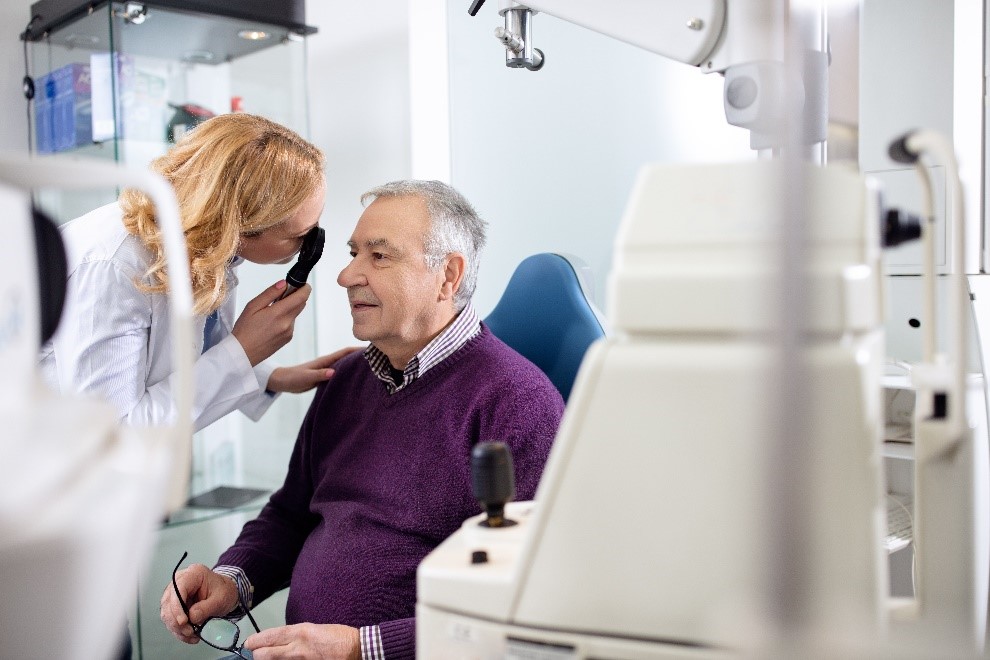Common Eye Injuries in Seniors and How to Prevent Them
According to the Centers for Disease Control and Prevention, more than 12 million adults in American aged 40 years and older experience some degree of vision impairment. As we age, the risk of developing vision impairment increases as the composition of the eye changes. In most cases, vision impairment isn’t life-threatening, but it’s important to understand the risks of various eye injuries as well as ways to prevent them.
Eye Injuries in Seniors 
Eye injuries can happen to anyone, but unfortunately, seniors are at higher risk for many common vision impairments and discomforts.
- Eye trauma- People associate a lot of injuries with falls, but one injury that is often overlooked is eye trauma. If a senior takes a fall and there’s force near or around the eye, it could result in damaged eye lids, cornea tears and bruising. Eye trauma can also happen if a senior has trouble judging their distance around corners and walks into something.
- Dry eye. When the cornea or the conjunctive in the eye doesn’t have enough fluid to stay lubricated, it causes dry eye, also known as sicca syndrome. As we age, dry eye becomes more common as they various layers of the eye responsible for keeping them moist tend to deteriorate. The most common symptom of dry eye is irritation. If left untreated, dry eye can cause small abrasions on the eye. Those with diabetes mellitus or rheumatism are at higher risk for dry eye. Dry eye can also be caused by environmental factors such as a dry climate or strong winds.
- Glaucoma. This eye disease develops when optic nerves are damaged because of elevated pressure within the eye. Glaucoma is a progressive disease and oftentimes shows no symptoms until later stages. Common symptoms include poor peripheral vision or tunnel vision. In addition to age, other risk factors include a family history of glaucoma and those who are near-sighted. Glaucoma can also be a side effect of various steroid medications.
- Cataracts. The eye has a transparent lens made of water and protein. A cataract happens when the protein in the lens clumps together, creating a cloudy film. Seniors with cataracts often experience fuzzy vision and glares. If the systems worsen and obstruct vision too much, surgery may be needed. Although age is the primary risk factor of cataracts, other factors include gender (women are at a higher risk), those who smoke and those who have a family history of cataracts.
- Ocular Melanoma (eye cancer). Although rare, adults aged 55 and older have an increased risk of developing ocular melanoma, or eye cancer. Ocular melanoma happens when a tumor develops in the eye. Symptoms of eye cancer typically include blurry vision, seeing shadows or flashes of light, partial or complete loss of vision or a noticeable dark spot on the eye.
Preventing Eye Injuries
While many eye injuries are common, there are steps you can take to limit your chances of developing an eye injury and reduce irritation.
- Get a yearly eye exam. Just like any other part of the body, your eye health should be monitored regularly. Check in with your eye doctor at least once a year to monitor any changes to your eyes. Also be sure to keep your eyeglass prescription up to date. Wearing old glasses without the proper prescription can increase your risk of vision impairment.
- Wear protective eyewear. If you are partaking in something where your eyes are at risk, make sure to wear protective eyewear. When you’re outside, wear sunglasses to protect your eyes from strong winds and small particles that may cause irritation.
- Wash your hands properly before touching your eyes. Making sure your hands are clean before you touch your eyes will limit you from transferring bacteria and other harmful substances. It is especially important to wash your hands after you’ve used cleaning chemicals such as bleach as chemical can cause sever irritation and even blindness.
- Invest in an air humidifier. To prevent dry eye and other eye irritations, keep the air humidity in your home high with an air humidifier. The air humidity will help keep your eyes lubricated. You can also fill small containers with water and place those around your home to keep the atmosphere moist.
It’s important to keep eye health top of mind but remembering all the dos and don’ts can challenging. If you or a loved one needs assistance in setting up air humidifiers, getting to and from the eye doctor or finding proper eyewear to keep yourself safe, Visiting Angels Horsham is here to help. If you’re in the Horsham, Hatboro, Willowgrove, Ambler Lower Gwynedd, Spring House and surrounding areas and you’d like to learn more about how Visiting Angels can assist you or a loved one, give us a call at 800-365-4189, or fill out this form.
